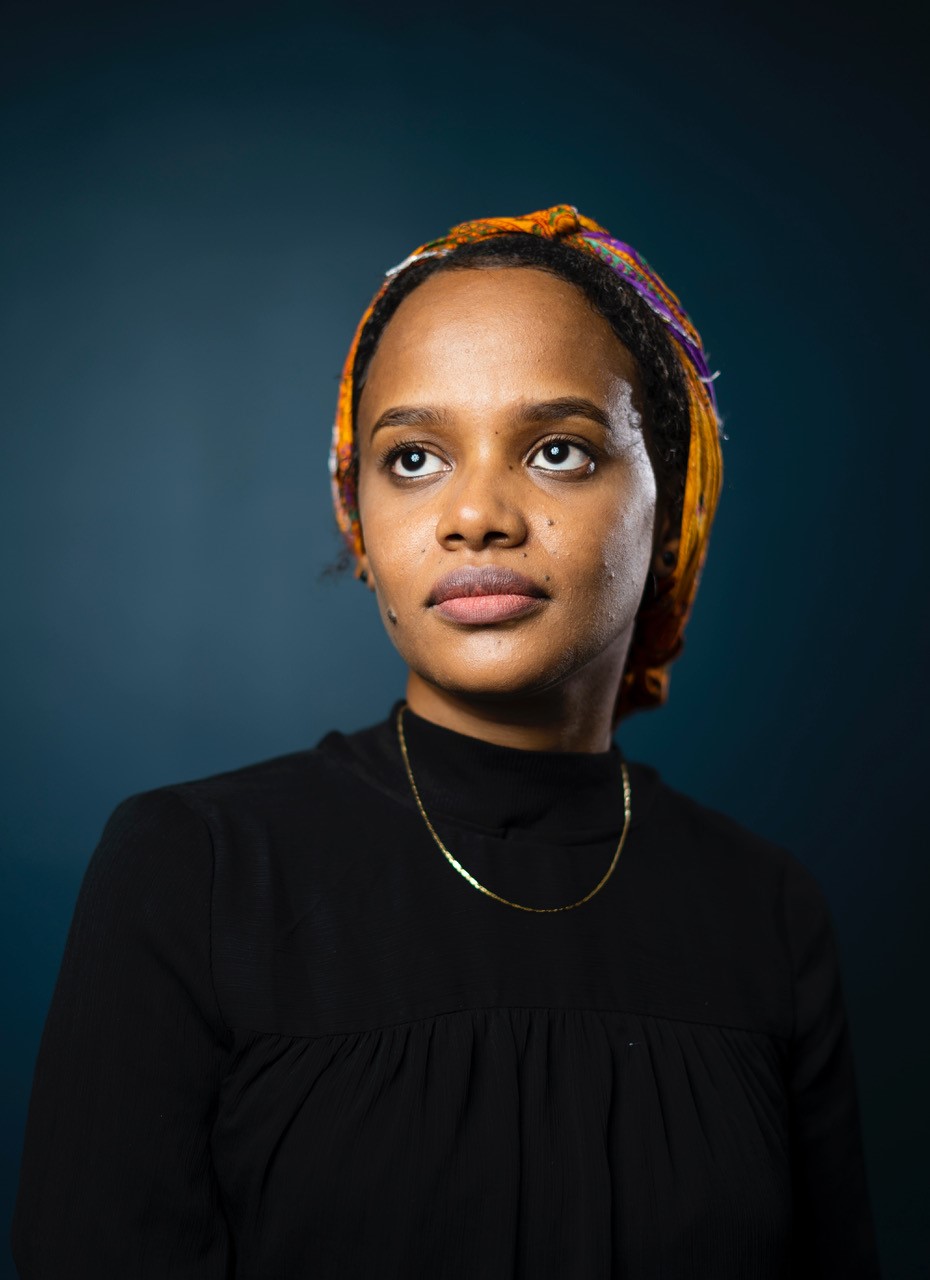1. THE EXHIBITION DRAWS ATTENTION TO THE DEMOCRACY MOVEMENT IN THE SUDAN
Following the revolution in Sudan in 2018–19, the artist’s work has undergone a lasting change. In her paintings and prints, the artist Amna Elhassan (b. 1988) depicts the sociopolitical changes and cultural resistance in Sudan. In the copious panorama painting "December" (2022) in the Schirn Rotunda, Elhassan processes the crushing of the democracy movement in Sudan and refers to the Khartoum massacre in 2019. This was perpetrated by government troops to put a violent end to the peaceful Sudanese Revolution (also called the December Revolution), which had led to the overthrowing of the thirty year dictatorship of the former president Omar al-Bashir. The revolution involved country-wide protests and a three-month-long occupation of the square in front of the army headquarters in Khartoum.
Dr. Sebastian Baden, director of the Schirn Kunsthalle Frankfurt, stresses:
With her location-specific panorama painting in the Schirn Rotunda, Elhassan sets a sign for courage and commitment to a living democracy.

2. ELHASSAN CREATES A MEMORIAL TO THE VICTIMS OF THE KHARToUM MASSACRE
During the massacre, women were raped, and many of the bodies of the victims were thrown by the attackers into the waters of the Nile. Elhassan’s painting shows the subject of the Nile as the river of life and death. It takes a stand against the assumption that death represents the end of individual dreams and ambitions. The three women portrayed in the painting represent the victims of the Sudanese Revolution. Elhassan also incorporates Arabic lettering, referring to the graffiti in public space which was used in the resistance movement not only to communicate political demands or to provide information about the dates and locations of the demonstrations, but also to honor the memory of the victims.

3. THE EXHIBITION cELEBRATES FEMALE EMPOWERMENT MADE IN SUDAN
The central theme of her selection of works for the Schirn is the status of women in Sudan and the perception of their bodies by society. In the inner Rotunda walkway, on the first floor of the Schirn, the artist is showing a selection of everyday scenes and portraits of Sudanese women, celebrating in her work their strength and resilience in this time of political and social change.


4. NEW PIECES ARE ALSO ON DISPLAY FOR THE FIRST TIME – WITH FORMATS THAT FILL THE ROOM
Characteristic of Elhassan’s painting style is her experimentation with different techniques, including analogue and digital drawing methods, oil, acrylic, and spray paints, and her approach to working in layers on canvas and paper. "December“ (2022) is the artist’s first large-format wall painting. In the inner Rotunda walkway on the first floor, Elhassan is also showing more than twenty paintings and prints which have been created since 2019, some of them specially for the exhibition. At the Schirn, the artist expands the pictorial space of the paintings beyond the canvas and thus inscribes the works into the exhibition space.
The curator of the exhibition, Larissa-Diana Fuhrmann, explains the artist’s working method: “A characteristic of Amna Elhassan’s art is the way she works in layers. She produces her motifs on the canvas or paper layer by layer, and at the Schirn she is now doing the same, but for the first time in an expansive format. With this multilayered approach, the artist reveals the complex reality in Sudan and the struggle for emancipation and liberation. By incorporating graffiti and extending the paintings into the exhibition space, Elhassan links the protests on the street directly with the museum space at the Schirn.”

5. aDMISSION TO THE PRESENTATION IS FREE
The Rotunda in the Schirn can be understood as a hybrid between public and institutional space and Amna Elhassan makes use of it for her art both on the inside and the outside. In the process, Amna Elhassan draws on aspects of Sudanese graffiti culture. Like the exhibition itself, the latter is also freely accessible to everyone; in effect, the artist employs the space of the Schirn in a similar way to the graffitis in Sudan, namely as a means of communication on the Sudanese democracy movement.

